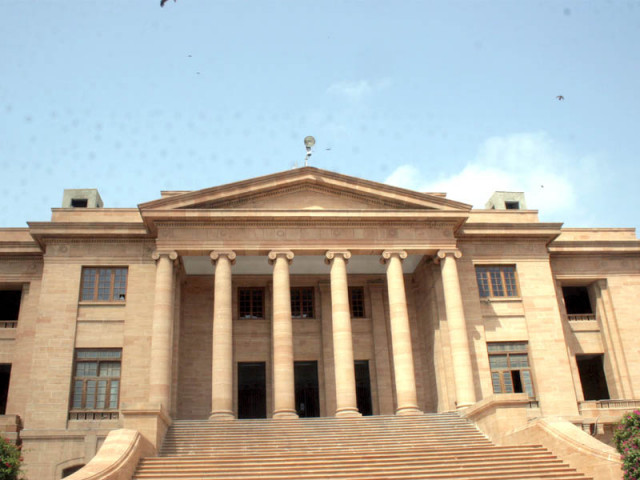Opposition challenges Sindh govt's move to repeal NAB law
Petitioners request SHC to annul National Accountability Ordinance 1999 Repeal Bill, 2017

Sindh High Court. PHOTO: EXPRESS
The law has been challenged through two petitions. One of them was jointly filed by the opposition parties including the Muttahida Qaumi Movement (MQM) - Pakistan, Pakistan Muslim League - Functional (PML-F) and Pakistan Muslim League - Nawaz (PML-N), while the other petition was filed by religio-social organisation Pasban-e-Pakistan.
A two-judge bench, head by SHC Chief Justice Ahmed Ali M Sheikh, issued notices to the deputy attorney-general, Sindh advocate-general and respondents to submit their replies before the hearing fixed for August 16 and adjourned the matter.
Opposition parties to challenge ordinance repeal in court
In their petition, the opposition parties' leaders - MQM-Pakistan Convener Dr Farooq Sattar, PML-F MPA Nusrat Sehar Abbasi, PML-N MPA Dr Arbab Ghulam Rahim and others - cited the provincial chief secretary, Sindh Assembly secretary, home and law secretaries, National Accountability Bureau (NAB) director-general and six accountability courts in the province as respondents.
The petitioners alleged that the PPP was engaged in corruption in the province and the NAB ordinance was the only stumbling block against corruption. Opposition leaders argued that the leadership of the PPP and bureaucrats serving under them were facing a number of investigations under the NAB ordinance, while there was a possibility of many more such cases being filed in the future due to the magnitude of corruption in Sindh.
The opposition parties alleged that in order to stall the working of the NAB authorities under the NAB ordinance, the PPP legislators in Sindh, while bypassing all the prescribed procedures, introduced the National Accountability Ordinance 1999 Repeal Bill, 2017 in the Sindh Assembly on July 3 and passed it without permitting any discussion or debate.
Sindh governor shoots down NAB ordinance repeal bill
They told the court that the governor had returned the bill to the assembly with a message to reconsider it, but the same unconstitutional bill was re-laid without any amendment and a summary was sent to the governor to reconsider signing the bill.
The opposition leaders argued that 10 days had lapsed since the bill was unlawfully passed, despite the governor returning it to the assembly for reconsideration. Thus, according to Article 116 of the Constitution, after the lapse 10 days since the date it was re-passed by the assembly, the bill now has been translated into an act of the Sindh Assembly. The government had also notified the same, therefore, the petitioners were left with no other remedy but to file the petition.
On behalf of the petitioners, Barrister Farogh Naseem argued that the National Accountability Ordinance 1999 Repeal Bill, 2017 was completely unconstitutional, malafide, void ab-initio and was liable to be annulled.
Court wants judges to enforce anti-profiteering laws in Sindh
He argued that the entire bill is premised on the supposition that after the abolishment of the legislative concurrent list in the 18th Amendment, matters of criminal law, procedure and evidence now solely fall within the ambit of provincial assembly. "This stance is altogether completely fallacious," he said, adding the federal and provincial legislatures will continue to have concurrent reach in criminal matters.
The Act is in total violation of articles 142(b) and 143 of the Constitution, Barrister Naseem argued. He pointed out the bare reading of Section 43 of the bill will reveal that the same had repealed the Sindh Enquiries and Anti-Corruption Act, 1991 and rules made there-under, as Section 38 of the Act provides that such statute will have an overriding effect notwithstanding anything contained in any other law in force for the time being.
Barrister Naseem alleged that the act was an attempt by Sindh legislature to save the PPP's leadership and bureaucrats serving under them from being exposed to inquiries, investigations, proceedings and cases under the NAB ordinance, which militates against the right of the petitioners and people of Sindh.
Apex court suspends high court's stay on doctors' appointments
The SHC was pleaded to annul the act, declaring it unconstitutional. The petitioners also requested the court to declare that the enacted law does not override or eclipse the inquiries launched or filed under the NAB ordinance.
The court was also requested to permanently, or during pendency of the petition, restrain the respondents from transferring any inquiry, investigation, proceedings or cases under the NAB ordinance to any other authority under the new law.



















COMMENTS
Comments are moderated and generally will be posted if they are on-topic and not abusive.
For more information, please see our Comments FAQ